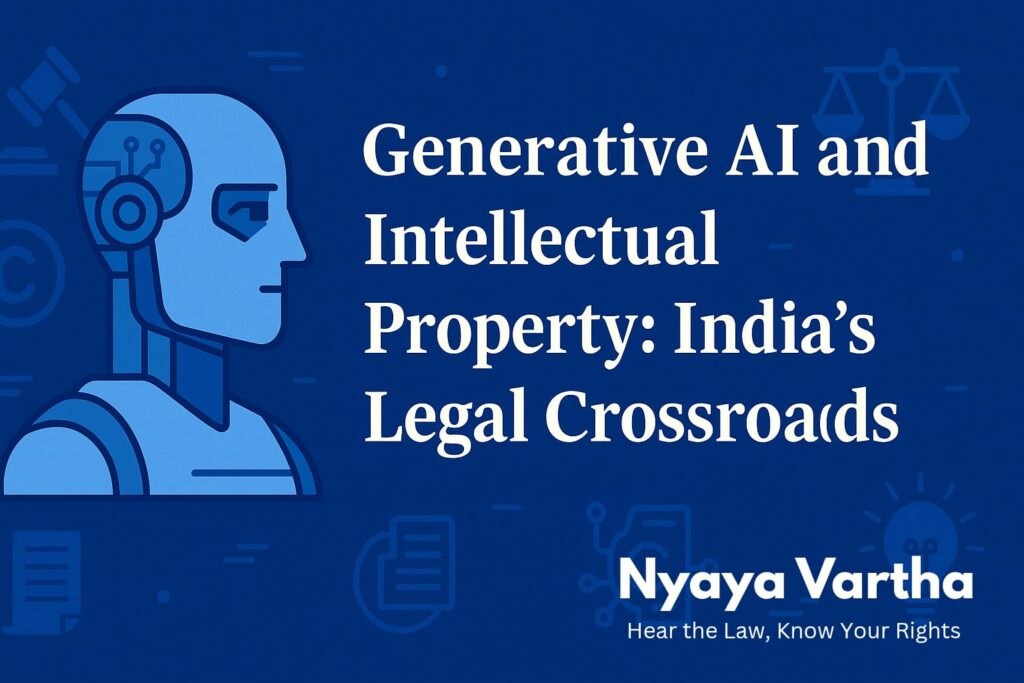Nyaya Vartha – Hear the Law, Know Your Rights
In today’s rapidly evolving digital landscape, generative artificial intelligence (AI) is completely transforming how content is created. From crafting text to generating stunning artwork and music, AI models like ChatGPT, DALL·E, and Midjourney are making waves across Indian industries. Yet, this incredible innovation brings with it complex legal and intellectual property (IP) challenges that need urgent attention.
This article dives into how Indian laws currently address AI-generated content, explores the concerns surrounding ownership and copyright infringement, and highlights the crucial legal reforms needed to protect creators and promote ethical AI use in India.

AI-Generated Content and Indian Copyright Law
Under the Copyright Act, 1957, copyright protection is exclusively granted to human authors. This means that content produced solely by AI—without any human involvement—currently doesn’t qualify for copyright protection in India.
This presents a significant vulnerability for creators, startups, and businesses. Can a company claim rights over a marketing poster created entirely by AI? Can a lawyer copyright a legal draft partially written using an AI tool? Under current Indian law, these questions remain largely unanswered and ambiguous.
Legal Issues Around AI Training Data
One of the most pressing concerns is the use of copyrighted content in AI model training. Generative AI tools are trained on vast datasets often “scraped” from the internet, which frequently include copyrighted materials like books, films, songs, news articles, and blog posts.
Indian copyright law provides limited exceptions for “fair dealing,” primarily for purposes like education, research, or judicial proceedings. However, using such data for commercial AI training—without proper consent—is highly likely to be considered copyright infringement.
We anticipate that lawsuits filed in 2025 by Indian media houses against AI developers for unauthorized data use will soon set important legal precedents.
Ownership and Attribution of AI-Assisted Works
Determining who owns AI-generated content is another complex challenge. Is it:
- The developer of the AI software?
- The user who provided the prompt?
- The company that uses the AI output?
Without clear legislation or definitive judicial decisions, this remains a source of confusion. Internationally, courts have generally denied copyright to works created solely by AI, reinforcing the principle that human creativity must be central to copyright ownership.
Deepfakes and Legal Loopholes in India
The rise of AI-generated deepfakes—highly realistic audio or video impersonations—poses severe ethical and legal risks, particularly in politics, media, and on social platforms.
Currently, Indian law lacks a dedicated statute specifically addressing deepfakes. While the Information Technology Act and the Indian Penal Code offer some remedies under provisions for forgery or defamation, there isn’t a targeted legal framework to effectively combat the threat of malicious synthetic media.
Given the growing public concern about misinformation and digital impersonation, regulatory reform in this area is urgently needed.
Policy Recommendations for India’s IP Future
To resolve the increasing conflict between technological innovation and intellectual property protection, India must consider the following crucial reforms:
- Amend the Copyright Act: Include specific provisions for AI-generated works, clearly defining human involvement, ownership rights, and infringement liabilities.
- Enforce AI Transparency: Mandate that AI companies disclose the datasets used for training and respect the rights of original creators.
- Enable Opt-Out and Licensing: Allow artists, authors, and publishers to opt out of having their content used in AI training and establish fair licensing models for AI developers.
- Support Judicial Clarification: Encourage courts to interpret existing laws in the context of AI and draw lessons from international best practices.
Conclusion: Balancing Innovation and IP Rights
India’s intellectual property regime stands at a critical juncture. As generative AI continues to advance, it fundamentally challenges long-established legal norms. The current absence of specific laws for AI-generated content creates significant risks for both content creators and technology developers.
To truly foster innovation while safeguarding creative integrity, Indian lawmakers must act swiftly and decisively. The future of digital creativity in India will heavily depend on how effectively the law adapts to this new era of human-machine collaboration.
